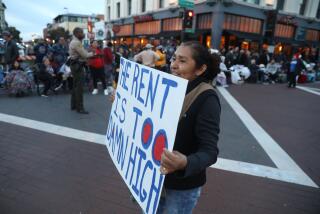Murray Weidenbaum dies at 87; economic advisor to Reagan
Murray Weidenbaum taught students at Washington University in St. Louis and presidents in the White House that government should get out of the way and let people and businesses work as hard as they can to achieve as much as they can.
He preached deregulation, and his syndicated newspaper columns caught the eye of Ronald Reagan, who in 1980 was running for president. Reagan took Weidenbaum to the White House as his top economic advisor.
At first, the administration used tax cuts to fight high unemployment and inflation. But when Reagan later pushed massive increases in the military budget, Weidenbaum quietly tendered his resignation, returned to St. Louis and resumed his 50-year career at Washington University.
A soft-spoken man, Weidenbaum never would have openly contradicted the president. But he believed in balanced budgets and said the revenue numbers didn’t support increased spending.
He continued to teach at Washington University’s Weidenbaum Center on the economy, government and public policy until three weeks ago.
Weidenbaum, 87, died March 20 at Barnes-Jewish Hospital in St. Louis. The university announced his death but did not disclose the cause.
Weidenbaum served five U.S. presidents. He first went to work for President Truman, in the basement of the Old Executive Office Building, where he later became chairman of the Council of Economic Advisers under Reagan. He continued working for the White House through the administration of President George H.W. Bush.
Weidenbaum believed that economic policy should be based on facts, not ideology. He was an expert in the nuts and bolts of federal budgets.
“If the benefits outweigh the costs, great,” he said. “If the costs outweigh the benefits, maybe you should take another look at the benefits.”
Steven Smith, director of the Weidenbaum Center, called him “a modest conservative, not necessarily a moderate conservative.”
Murray Lew Weidenbaum was born Feb. 10, 1927, in the Bronx and reared in Brooklyn, N.Y. His grandfather sharpened knives for a living and his father drove a taxi and owned a neighborhood market.
He was brought up blue-collar, liberal and pro-union. If you crossed a picket line, he was taught, the almighty “would hurl a thunder bolt at you.”
He graduated from City University and earned a doctorate in economics at Princeton. He served in the Army in World War II, stationed stateside.
In New York, he took a state job investigating unions. He later said that he had found Teamsters leaders intimidating businesses.
That led him to begin writing about the benefits of free markets and free trade.
While teaching at Stanford University, he became a consultant with NASA. His family thought their next stop would be Washington, D.C. Instead, he took a teaching post at Washington University, which had landed a big grant from the military. In 1964, he moved to St. Louis.
He returned to Washington, D.C., in 1969 as assistant secretary of the Treasury under President Nixon. He helped develop revenue sharing with state and local governments.
He came back to Washington University and in 1975 founded what became the Weidenbaum Center.
One of his best friends was Tom Eagleton, a liberal Democratic senator from Missouri. They taught together and students sometimes wondered why there wasn’t more fireworks between the two.
Weidenbaum married Phyllis Green in 1954 after a blind date. She was a Democrat, which led to jokes about a “mixed marriage.”
Weidenbaum was a fiscal conservative who left it to others to fight over social issues such as abortion and gay rights. He considered himself in the middle, a compromiser, who knew he was right if he could make both sides equally unhappy.
Friends said that his wife helped keep him in the middle. “She kept him civil and made sure he was careful in criticizing those who disagreed with him,” Smith said. “That made him an attractive personality to both sides.”
Besides his wife, Weidenbaum is survived by a son, two daughters, six grandchildren and a sister.
Michael Sorkin writes for the St. Louis Post-Dispatch and McClatchy Newspapers.
>Friends said that his wife helped keep him in the middle. “She kept him civil and made sure he was careful in criticizing those who disagreed with him,” Smith said. “That made him an attractive personality to both sides.”
Besides his wife, Weidenbaum is survived by a son, two daughters, six grandchildren and a sister.
Michael Sorkin writes for the St. Louis Post-Dispatch and McClatchy Newspapers.
More to Read
Start your day right
Sign up for Essential California for the L.A. Times biggest news, features and recommendations in your inbox six days a week.
You may occasionally receive promotional content from the Los Angeles Times.






